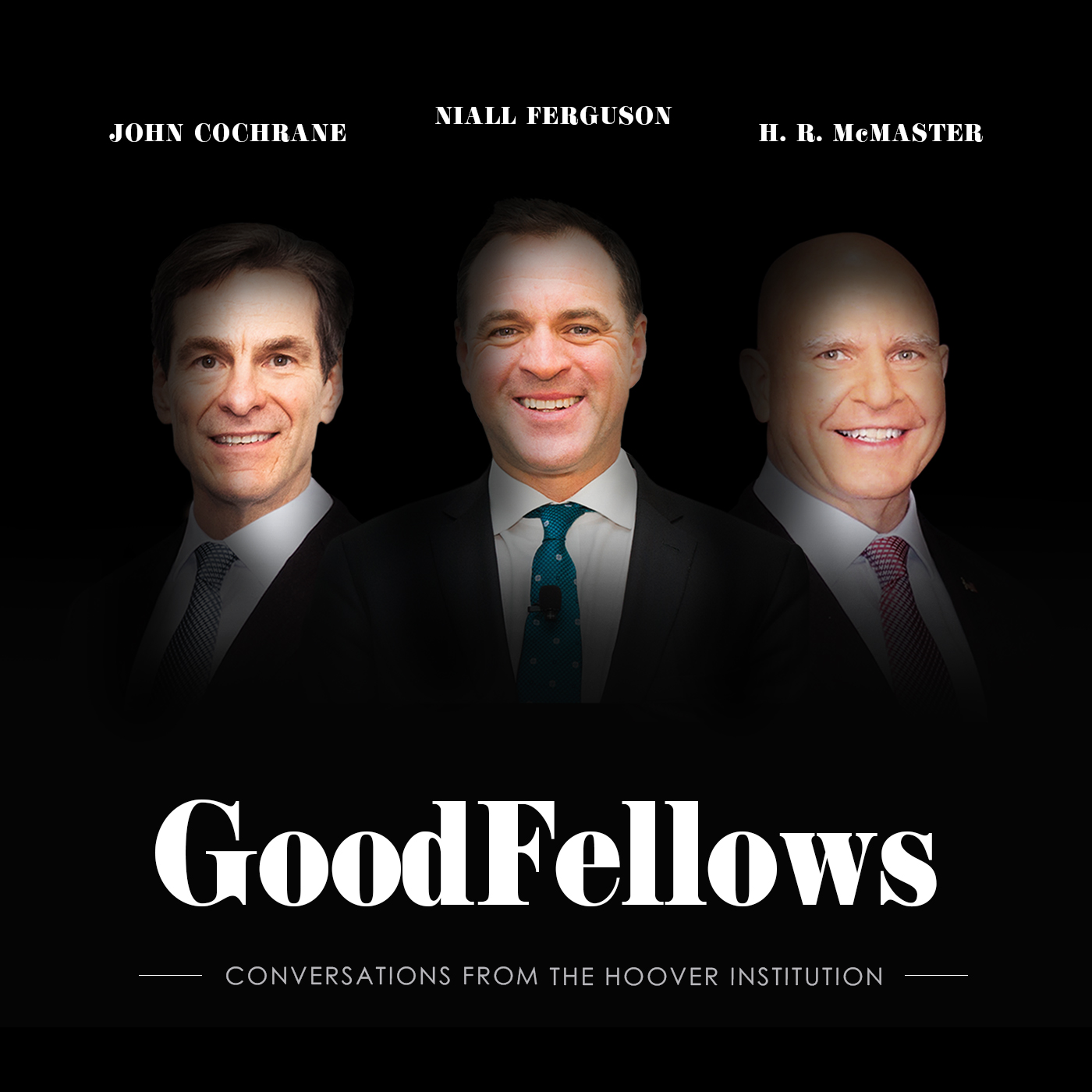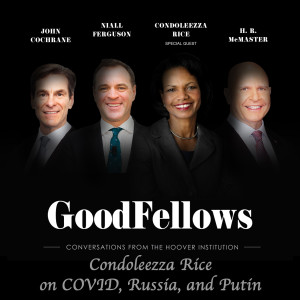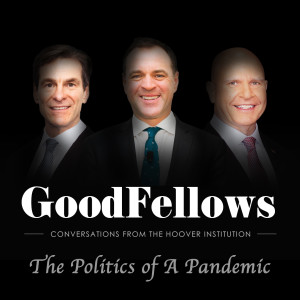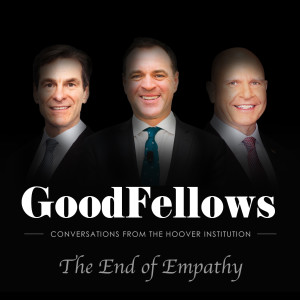

3M
Downloads
154
Episodes
In uncertain times what’s needed is not just clarity about today’s pandemic, but insight into the challenges that lie ahead as America recovers and returns to normal. GoodFellows, a weekly Hoover Institution broadcast, features senior fellows John Cochrane, Niall Ferguson, and H.R. McMaster discussing the social, economic, and geostrategic ramifications of this changed world.
Episodes

Wednesday Jun 24, 2020
Condoleezza Rice On COVID, Russia, And Putin
Wednesday Jun 24, 2020
Wednesday Jun 24, 2020
This week on GoodFellows, we tackle a very complex geopolitical topic: Russia and the effects the COVID-19 crisis has had on that country’s economy, internal politics, international relations and aspirations, and ability to influence other countries and regions. To help us, we are fortunate to have one of the world’s foremost experts on the subject, someone who has years of direct experience in dealing with Russia and with Vladimir Putin himself: Hoover fellow (and soon to be director of the Hoover Institution) Condoleezza Rice, the former secretary of state and national security director under George W. Bush. She, along with our other GoodFellows (that’s H. R. McMaster, John Cochrane, and Niall Ferguson), conduct a fascinating conversation on why the COVID-19 crisis is an especially difficult problem for Russia to manage and solve. We also get Secretary Rice’s unique take on the current social unrest in the United States, a perspective informed by her upbringing in the South and her own experiences with racism.
SPECIAL GUEST:
Condoleezza Rice is a Professor at Stanford University's Graduate School of Business and a Fellow on Public Policy at the Hoover Institution where she will become Director on September 1. Rice was the 66th Secretary of State. She is also a founding partner of RiceHadleyGates, LLC. From January 2005 to 2009, Rice served as the sixty-sixth secretary of state of the United States, the second woman and first African American woman to hold the post. Rice also served as President George W. Bush’s assistant to the president for national security affairs (national security adviser) from January 2001 to 2005, the first woman to hold the position.
Recorded June 23, 2020 3 PM PT

Wednesday Jun 17, 2020
The Politics Of A Pandemic
Wednesday Jun 17, 2020
Wednesday Jun 17, 2020
Our guest this week is Francis Fukuyama, the Olivier Nomellini Senior Fellow at the Freeman Spogli Institute for International Studies. His new article in Foreign Affairs, "The Pandemic and Political Order” provides the topic for this edition of GoodFellows. The piece poses a slew of intriguing questions and issues that the GoodFellows opine on: What will the world will look like post-COVID-19 pandemic? How will the global economy recover? Does the pandemic mark the end of Reaganism and Chicago School free-market economics? If so, what comes next? Also, why have some countries dealt with the crisis better than others so far, regardless of their political ideologies? Finally, even though the pandemic originated in China, East Asia has generally managed the situation better than Europe or the United States. Does this signal that COVID is shifting the economic tectonic plates under our feet? It’s a fascinating conversation that attempts to peek around the bend and predict what the world may look like over the next 18 to 24 months.
SPECIAL GUEST:
Francis Fukuyama is Olivier Nomellini Senior Fellow at Stanford University's Freeman Spogli Institute for International Studies (FSI), Mosbacher Director of FSI's Center on Democracy, Development, and the Rule of Law (CDDRL), and Director of Stanford's Ford Dorsey Master's in International Policy. He is also professor (by courtesy) of Political Science. Dr. Fukuyama has written widely on issues in development and international politics. His 1992 book, The End of History and the Last Man, has appeared in over twenty foreign editions. His most recent book, Identity: The Demand for Dignity and the Politics of Resentment, was published in Sept. 2018.
Recorded June 16, 2020 1PM PT

Sunday Jun 07, 2020
The End of Empathy
Sunday Jun 07, 2020
Sunday Jun 07, 2020
In this special edition of GoodFellows, we’re joined by Roland Fryer, Professor of Economics at Harvard University. His work on education, inequality, and race has been widely cited in media outlets and in Congressional testimony. In this wide ranging conversation on the events of the past 10 days, the GoodFellows (moderated by Niall Ferguson - Bill Whalen is off this week) discuss Roland’s experiences with law enforcement as a teenager, which informed his future work researching the use of force by police departments and the disparities in how it is applied to African Americans. They also discuss one of the more radical proposals stemming from the George Floyd murder: defunding police departments. The implications of enacting that idea are wide-ranging, and the GoodFellows have a lot to say about it. The conversation then takes up other possible reforms: changing the organizational culture of police departments, engaging departments more with the communities they police, and improving communication —between the police, citizens, community activists, politicians, and yes, academics-- as our best hope to emerge from this tragedy with a better society.
SPECIAL GUEST:
Roland G. Fryer, Jr. is a Professor of Economics at Harvard University. Fryer's research combines economic theory, empirical evidence, and randomized experiments to help design more effective government policies. His work on education, inequality, and race has been widely cited in media outlets and Congressional testimony. Professor Fryer was awarded a MacArthur "Genius" Fellowship and the John Bates Clark Medal -- given by the American Economic Association to the best American Economist under age 40. Among other honors, he is a fellow of the American Academy of Arts and Sciences and a recipient of the Calvó-Armengol Prize and the Presidential Early Career Award for Scientists and Engineers. At age 30, he became the youngest African-American to receive tenure at Harvard.His current research focuses on education reform, social interactions, and police use of force.
Recorded June 5, 2020 NOON PT